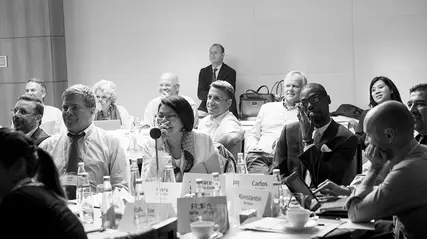Employers across the global industrial and manufacturing landscape are crossing national, political and competitive boundaries as never before to find leaders who can open new international markets and create sustainable business growth for 2015 and beyond.
“Most of the companies that are relevant and have good products and high brand recognition are going for international growth, so this new global interconnectivity continues to emerge as a driving megatrend,” says Michael Kantel, Stuttgart-based Industrial/Production Practice Leader for Kestria (formerly IRC Global Executive Search Partners).
“These companies are focused more and more on global market opportunities,” Kantel adds. “They’re creating the infrastructure, technology and teams needed for serving new international customers – and they’re drawing from the competitive advantages of sales, process and engineering expertise that have been an ongoing contributor towards their top performance in national markets up to now.”

This shift of industrial production investment is evidenced in data released in Germany by the DIHK (dihk.de) that shows the Eurozone as the world’s top target for foreign investments in the manufacturing industry, followed closely by China and, some level back, the United States.
The purchasing power of China, India and other fast-growth economies around the world, as reported by The Organisation for Economic Co-operation and Development (OECD), will continue to frame the competitive dynamics and talent required for industrial production for decades to come.
Focus on Foreign Markets
Yet it is already clear that the growing interconnectivity between national economies and manufacturing supply chains is having a profound impact on the speed and scope of industrial investment. It is most assuredly revealed in the search for talent that understands technology and how it can be applied to fuel new product development in foreign markets.
Just consider how German companies like pneumatics market leader Festo and laser cutting company Trumpf are expanding globally, with a particular interest in Asia and also Brazil, and how American companies are exploring new investment in Europe, with a renewed focus on Germany.
In turn, Kantel observes, Chinese companies such as the Dahlia Machine Tool Group are steadily increasing their investments in German companies in order to gain technology and find out how these companies build Tier 1 or Tier 2 to Original Equipment Manufacturers (OEM’s).
Germany has a unique global position in the machine building and tooling industry. Chinese manufacturers may be able to produce goods more cheaply but the industry view is that it may not yet be with the consistently high quality of German products.
Yet even the leading German manufacturers are looking to the United States, and to some degree, Southeast Asia and China for new expansion and growth opportunities of their own. German companies in the automation technology and control technology sectors are expecting to build new manufacturing plants in Southeast Asia and China, underscoring this shift.
Market-moving Companies Set the Stage
Kantel says companies with the size and scale of Apple, for example, are redrawing competitive boundaries and establishing the seeds of incredible industrial and manufacturing investments.
They’re doing that simply by pooling the right industry, high tech, manufacturing and sales talent in the markets they see to have the most growth potential. These investments by Apple and other market-moving employers, in turn, spur other companies – including components manufacturers – to follow suit, multiplying the commercial investment in a country or region several times over.
Kantel says the automotive, machine building, control and automation, and chemicals sectors are more interconnected than ever before, and growing even closer in part because of the integration of production and technology best practices created in the pursuit of new product development.
As companies continue to learn how to open new markets, they apply these lessons toward their next target market. “The communication is extremely fast,” Kantel says. “If there’s a market, they will build a plant.” He says international market development is often led by Tier 1 producers for OEMs, who do much of the manufacturing that enables serial production in the newest markets they serve.
The Search for a New Generation of Talent
Kantel says a new generation of industrial production and manufacturing talent is building new tools to achieve new business aims. With these ‘up-and-comers’, he says, “They know what the wheels of the future are and how to turn them. The wheels are new with all the new technology.”
The leaders of the future in industrial manufacturing and production companies will require lots of business basics, Kantel says, but they’ll bring more expertise and new resources to do the same things. “These younger team leaders and department managers – they’re deeper in technology,” Kantel says. “Things are becoming so complex, new technology is growing in importance.”
For general managers in the machine building industry, for example, it’s already hard to decide the right business direction and strategy for the future without having this deep technology experience.
Eventually, managers with no technology background or unwillingness to immerse themselves in it will disappear and be replaced by a broader understanding of product and processes and interconnectivity. To effectively replace those managers, executive search consultants must have the ability and experience to identify leaders who bring business and technology management skills.
These next-generation managers must be individually prepared to drive product and service innovations themselves, because they will be seen to be in the driver’s seat when it comes to creating new business lines and opening new markets.

But there is a huge shortage of engineers to design products with a world-class hardware development tools. More software skills – especially embedded software – are required and there is a massive demand for web-based software for industry, creating access to software via a web page.
“If these companies want to grow and seize on the international opportunities, they need skilled managers but also people with a foot in the country and the experience within a manufacturing organization to manage the process as well as the growth,” Kantel shares.
As large numbers of industrial manufacturing companies’ employees look ahead to retirement, management teams are looking for a new generation of skilled workers to replace them. This is especially true for smaller, family-owned companies with a need to stay ahead of the competition.
“Technology experts who are specialized in product development are few in number, so the competition for them is already quite high. Those with software and hardware development experience can essentially take their pick of five or six immediate job offers should they wake up and find themselves unemployed,” Kantel says. “Many of these engineers would never go in search of a new opportunity because they are challenged and rewarded by their current work.”
That is, unless someone disrupts their career point of view and offers a new, more interesting and perhaps more highly compensated challenge. Connecting with these technology-savvy, often younger leaders will present significant opportunity for executive search consultants who know that market best.
Looking ahead, Kantel says, the competition for engineering and strategic leadership talent will be among the fiercest he expects across the industry landscape. “We can really see these megatrends unfolding, because the executive search profession is right in the middle of the competition for skilled talent required to achieve corporate growth objectives.”
The push for new, international business growth is changing the dynamics of the global industrial and manufacturing landscape. In the short-term, Kantel predicts, the competition for talent will intensify, and the pursuit of deep knowledge and development of global processes will top the priorities list for many industrial and production leaders in 2015 and beyond.
The collective best practices that emerge from global production and industrial experience are already being globalized, while the search goes on locally in markets around the world for the next generation of leaders who can keep pace with the accelerated pace of change.
About Michael Kantel

Earlier in his career, Michael served as a Regional Sales Director for Apple Computer, and also as Sales Director for Consulting and Projects with Festo. He holds diplomas in education, industrial engineering and HR development. He is also an Associate Professor at the Corporate State University of Baden Württemberg (DHBW), lecturing in all aspects of Human Resources and Development.
Michael can be reached at +49 (0) 711 – 21 07 04 10 and by e-mail at michael.kantel@ircsearchpartners.com.
About Kestria (formerly IRC Global Executive Search Partners)
Kestria (formerly IRC Global Executive Search Partners) is a market leader in the global executive search industry with a track record of more than 30,000 completed search assignments for more than 2,000 clients across industry segments and executive management functions. Our clients range from large multinationals to middle market companies that enjoy the advantage of working with leading local firms around the globe, providing them access to expert local market knowledge, the agility and commitment of owner-operated firms, and the global reach of a strong alliance.
With a growing roster of leading executive search firms across EMEA, the Americas, Africa, Asia and Australia, Kestria (formerly IRC Global Executive Search Partners) has more than 300 accomplished executive search professionals working on six continents, and in more than 40 countries. Ranked among the world's ten largest retained search firms, Kestria (formerly IRC Global Executive Search Partners) has provided consistent and high-performance executive search solutions to its clients for the past twenty years.


